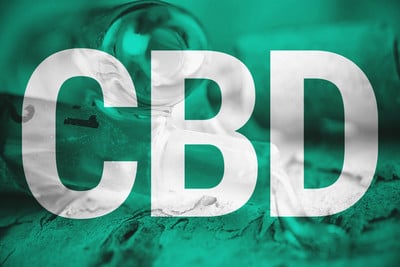.

Can CBD Help Relieve Toothache?
There is little research into the applications of cannabinoids in dentistry, but as studies continue to unveil CBD’s effects on the body, it’s worth taking a look at how it may impact dental health conditions like toothache.
There is a growing body of research, in the preclinical and early clinical stages, exploring the impact of CBD on numerous bodily functions and conditions. With specific studies citing the potential anti-inflammatory, antioxidant, and bone-resorption inhibitor[1] properties of cannabinoids, might tooth and gum conditions like toothache be addressed by the pharmacological effects of cannabinoids? Given that there is no clinical evidence to draw upon, we must dig a little deeper into associated research.

WHY DO WE GET A TOOTHACHE?
Most toothaches happen because of an infection. The inner part of our teeth contains nerves and blood vessels that make us feel heat, cold, touch, and pain too. One of the inner parts is named dentine, but there exist other, deeper parts such the pulp, and just like any other parts of our body, they hurt when they become inflamed by an infection.
The tiny food fragments left on your teeth, particularly by starch and sugar, start up a bacteria farm, which spreads to both the visible and invisible parts of your teeth. Infrequent or improper brushing helps the farm thrive. In the next step, cavities can form and grow deeper into your tooth, causing a painful infection, and eventually the destruction of your tooth. The pain is produced when the bacteria and their acidic environment are able to reach the dentine or deeper structures, increasing the bloodstream, swelling, and finally pressure on the nerves, which consequently send the pain signal to the brain.
Another reason for toothaches is periodontal disease and its related painful abscesses, which affect the gums and bones where the teeth are grafted. These infections result in tooth exposition, which, together with the inflammation, can finally cause periodontal pain. Crooked, overlapping, rotated teeth can also cause periodontal pain, together with hormonal changes, stress, or a poor diet.
Whatever the cause of pain might be, it is always recommended to visit a medical professional if you have a long-lasting or a severe toothache. Moreover, a professional check-up and cleaning every 6 months or 1 year is always advisable as a method of prevention for any dental disease.
CBD AND OUR TEETH
We know that a combination of analgesic, antibacterial, and anti-inflammatory agents are needed to kill toothaches. Effective anti-inflammatory action is even more desirable than a mere analgesic effect. A bunch of prescription pills and topicals are available for this purpose, but what about a natural remedy?
Our body creates inflammation usually to fight bacteria, a viral attack, or trauma. Although in most cases an active inflammatory response is beneficial, there is such a thing as too much. When inflammation is excessive, despite the threat improving, the body could become damaged by this reaction too. Here is where anti-inflammatory, antibacterial, antiseptic, and analgesic action might be effective.
In this arena, a 2008 study[2] published in the Journal of Natural Products cites CBD, among other cannabinoids, as "show[ing] potent activity against a variety of methicillin-resistant Staphylococcus aureus" bacteria.
A 2009 study[3], performed at the Laboratory of Molecular Biology, University of Uberaba, Brazil, looked into CBD for an experimental model of periodontitis in rats. Periodontitis is a painful infection that causes the bone and soft tissue that supports the teeth to degrade. Thirty days after rat subjects were administered CBD, researchers assessed tissue samples to find that CBD inhibited proinflammatory cytokine production and decreased bone resorption by inhibiting RANK/RANKL proteins.

SHOULD YOU USE CBD FOR TOOTHACHE?
When taken alone, oral consumption of CBD is considered generally safe according to the World Health Organisation. Given the compound’s apparent lack of serious side effects, there’s no research that suggests applying CBD directly to the teeth and gums when you have a toothache will do you any harm. The problem is, there also isn’t enough research to say that it will do you much good either.
Different types of CBD products are processed by the body at varying rates according to their respective method of administration. If you decide to try them, oral sprays, oils, and tinctures can be applied right to the affected area, using your (thoroughly cleansed) finger to gently spread the solution on the tooth and nearby gums. You can also empty a CBD capsule and apply the gel to the affected area. Alternatively, you could try a tea bag with high-CBD flowers.
Sometimes, it might be better to not even touch the affected or painful area. CBD capsules, oils, and edibles can be consumed to avoid making direct contact, but these methods take longer to take effect than topical administration. Cannabis-infused toothpastes are starting to enter the market, and, of course, you can create your own CBD-rich formula by adding a drop of your preferred CBD oil to your regular toothpaste. Furthermore, you can even prepare a homemade toothpaste with ingredients like baking soda, peppermint oil, coconut oil, and CBD oil.
SIDE EFFECTS
Cannabinoids can reduce the amount of saliva you produce. A dry mouth is not just unpleasant, it’s also a good biochemical environment for bacteria farming, and therefore for gum and teeth disease. Smoking, together with coffee, tea, and alcohol, will dry out your mouth and help the tartar form on your teeth. The necessary steps to increase saliva production and avoid infections and the “cottonmouth effect” include drinking water, using mouthwash, chewing sugar- free gum, and, most of all, brushing and flossing properly and frequently. With good oral health habits, the drying effect induced by CBD and other substances should not be a problem for most people.

TALK WITH YOUR DENTIST
The potential of CBD for toothache and dental diseases is yet unclear. Regardless, you should always consult your doctor before adding CBD to your regimen, especially if you’re already taking other medications, like painkillers or blood thinners. To just use CBD is not an alternative for proper dental care.
In the coming years, we can hope to see encouraging results from research on CBD and toothache, and dental health in general. In the meantime, you can read a bit more about CBD to decide if experimenting with CBD products can do anything else for you!
- Cannabidiol as an emergent therapeutic strategy for lessening the impact of inflammation on oxidative stress - PubMed https://www.ncbi.nlm.nih.gov
- Antibacterial cannabinoids from Cannabis sativa: a structure-activity study - PubMed https://www.ncbi.nlm.nih.gov
- Cannabidiol decreases bone resorption by inhibiting RANK/RANKL expression and pro-inflammatory cytokines during experimental periodontitis in rats - PubMed https://www.ncbi.nlm.nih.gov







































